by Francis Owtram and Malak Hayek
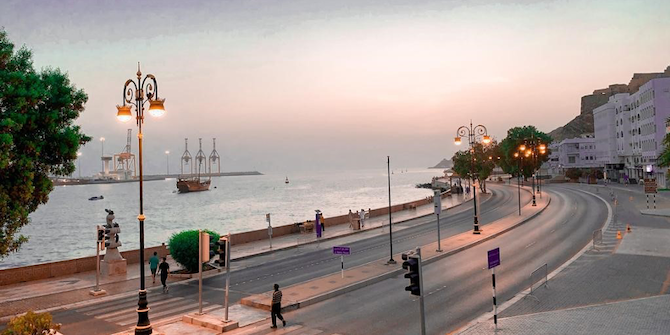
Fifty years ago today, on 23 July 1970, Sultan Qaboos removed his father, Sa’id bin Taimur, in a British-supported palace coup, to take power in Oman at the height of the Dhofar War against the People’s Front for the Liberation of Oman and the Arabian Gulf. The rebellion in Dhofar was partly fuelled by the region’s numerous restrictions and lack of healthcare. The 23 July coup is sometimes seen as the founding of the modern Omani state. Built on oil revenues from exports which had started in 1967, this period of modernisation is often referred to in the country as the Omani renaissance. In a strange echo to the wartime circumstances of Qaboos’ ascent to power in 1970, following Qaboos’ death on 10 January 2020, the new Sultan Haitham found himself in short time in charge of the Omani front of what has been likened to a world war against an invisible enemy: the global battle against the COVID-19 pandemic.
Whilst the Sultanate has been relatively successful in countering the public health threat, it is the pandemic’s economic impact caused by the worldwide shutdown – given 45% of Omani exports go to China – that may constitute the greater challenge for Oman. This is because the lack of demand for Oman’s main source of income compounds problems caused by already low oil prices and thus exacerbates existing critical issues for the Omani rentier state. COVID-19 has thus erected an additional financial obstacle which Sultan Haitham’s government must overcome in order to implement reform measures. As with other Gulf petro-states, the Omani rentier state has, through the receipt of large oil revenues sold on the world market, largely obviated the need to extract income from the populace in the form of taxation. The state provision of wide-ranging benefits for Omani citizens has provided the basis of the country’s social stability since the 1970s, the potential fragility of which was illustrated during the Omani protests during the Arab Spring. This social contract is now arguably under greater strain than at any time since then, with an accelerated decline in Omani house-hold incomes, according to a Fitch group analysis, and unemployment set to increase from 2.7 to 3.8 percent in 2021 cautioning a ‘potential for social instability.’
COVID-19 has increased the pressure, with the public health threat necessitating extreme policy measures, with a corresponding devastating economic impact on the finances of the Sultanate.
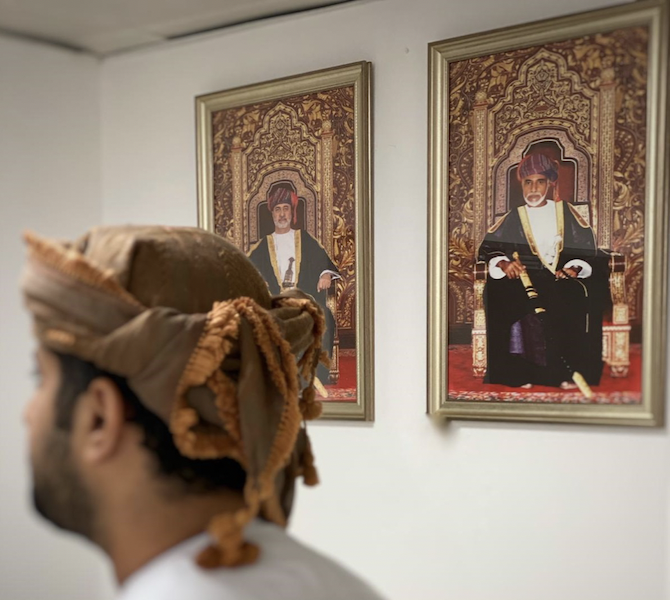
A War Against COVID-19?
The campaign against COVID-19 has often been compared to a war with talk of frontline staff, wartime measures and heroes. Although the wartime exhortation may be useful in mobilising citizenries to accept restrictions, there are also potential serious difficulties with the analogy and indeed, in some states, this has been used to marginalise migrants and paint them as enemies. In Oman, as with other Gulf states, the virus’ contagion brought the living standards of many low-paid migrant workers under acute attention. Duqm, the largest free zone in Oman, was closed off due to a surge in infections, just weeks after the Special Economic Zone Authority Duqm (SEZAD) had announced new standards for workers’ accommodation.

Policy
Notwithstanding problems with this wartime analogy, and cognisant of the need to use it critically, it can be said that Oman is, fortunately, one of the quieter fronts in this global battle. Though its population is ranked third in the GCC, after Saudi Arabia and the UAE, Oman has more confirmed cases of COVID-19 than the rest of the Gulf states (bar Saudi Arabia), though this may be a positive sign of greater testing.
As in the other Gulf oil monarchies, a large percentage of Omani citizens are directly employed in the public sector, with the government able to ask them to stay at home and support them in their lockdown, thus helping to reduce the spread of the virus. It is worth noting that, for most non-Omani migrant workers – who make up 45 percent of the country’s population – this choice was not available to them. There have been alleged reports of rioting by workers at sites for Al Tasnim company, where 2000 workers were laid off for demanding immediate repatriation, which the company argued it could not provide given recent economic hardships.
There has been a mix of ‘prescriptive nationalisation policies’ through quotas and prohibitions, as well as policies based on market incentives, introduced recently by the Omani government concerning migrant workers. Most notably, the No-Objective-Certificate (NOC) has been abolished, which had banned non-Omanis from re-entering the country for two years if they left their employer without permission, inviting debate from Omani economic specialists and entrepreneurs. Some argued it would be detrimental to Omani business, and others hailed it as a step in the right direction that would increase competitiveness and eventually increase salaries.
Research on the ‘Gulfisation’ of the labour market and its prospective reform shows that a pillar of a healthy competitive economy – that would eventually induce greater employment of nationals in the private sector – depends greatly on mobility rights that allow both foreigners and citizens to compete on even grounds. Closing this gap encourages citizens to appear more appealing to employers, which accordingly improves productivity and skill acquisition. To this end, the abolition of the NOC, allowing migrant workers to transfer sponsorships without permission from their sponsor after completing a two-year contract, is the kind of market incentive policy that deals with the core issue of market segmentation.
However, the Omani government has simultaneously introduced quotas and prohibitions on renewal of work-permit licenses for some expats in various sectors, including the pressing for the ‘Omanisation’ of delivery services and other ‘work that can be easily [carried out by] Omanis.’ Though, at the same time, some sectors that had been preserved for Omani nationals, such as the construction industry and brick factories, have been allowed to hire expats in a ‘move intended to support the economy amid the COVID-19 pandemic.’
Administrative micro-interventionist policies such as these, which place quotas and controls on business, are likely to be more prone to ‘widespread evasion’ and ‘political wrangling.’ As Steffen Hertog suggests, experiences of past ‘Gulfisation’ policies ‘underline the need to address the underlying causes of labour market segmentation instead of trying to alleviate them after the fact. A more flexible regime would aim to avoid-micro-interventions but instead narrow the gap in labour prices and labour rights between nationals and foreigners.’
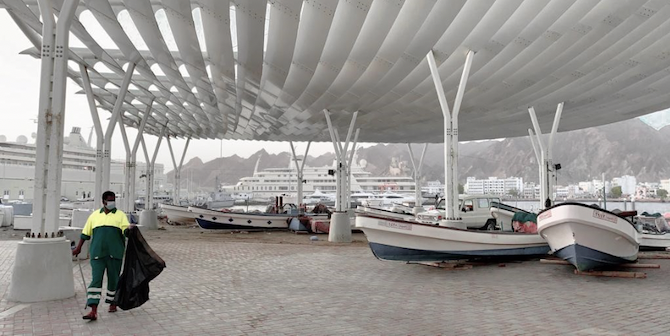
Other measures the Omani government took early on in the pandemic were similar to efforts elsewhere in the world. Early on, it closed all non-essential shops. Sultan Haitham instituted a Supreme Committee which implemented travel restrictions of increasing severity so that by 29 March all commercial flights to and within Oman (except Musandam Governorate) were shut down. From mid-March government offices operated on 30 percent staffing, all schools were shut and only food stores and pharmacies were allowed to remain open. Restaurants could only offer food as a takeaway service, tourists were asked to leave the country and tourist sites closed. Mosques (except for the call to prayer) and non-Muslim places of worship were closed. From March full lockdowns were implemented in Muscat, Dhofar and Duqm, though since April the lockdown restrictions in Muscat have been eased.
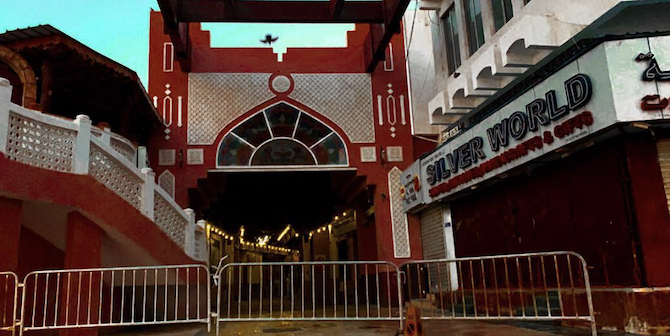
People
The first confirmed COVID-19 cases in Oman were recorded on 24 February with two women who had returned from Iran. The first death – a 72-year old Omani national – came at the end of March. Initially, there were more cases in the expatriate community, but as the pandemic has progressed there have been more infections and deaths amongst Omani citizens. By the beginning of July a six-week COVID-19 surge was evident, according to the health minister. By 13 July there had been 259 deaths in total and on that day there were 2164 new cases of which 1572 were Omanis and 592 were non-Omanis.
Public gatherings were banned, but private gatherings were merely recommended against. As elsewhere, these nuances in the message sometimes led to confusion for the population, a potential problem in combatting COVID-19. An economist, Dr Abdullah Al Bahrani commented: ‘Sadly, I don’t see numbers easing in Oman. People are not abiding by the guidelines and it is concerning. I worry about the pressure on the healthcare system. The economy will take a hit because we have not flattened the curve. There is no economy without people!’
Economic Impact
As with the other Gulf states, the effect of the global shutdown and the plummeting price of oil, combined with an oil price war with Russia, have had a devastating effect on the health of Oman’s economy and finances. Further compounding its financial strain, Oman has a comparatively large population and is without the vast hydrocarbon reserves of Saudi Arabia, Kuwait, Qatar or the UAE. This was further exacerbated for a mid-rent state like Oman which has a smaller rent-per-capita, compared with a high-rent state like Kuwait. In March 2020, Oman government bonds were downgraded by three rating agencies due to the COVID-related drop in oil price and the increased demands on government finances – which, as Omani analyst Dr Hatem Al Shanfari termed it, represented an intensification of what was already ‘a perfect storm’.
However, despite public debt set to rise to a record 77.1 percent of GDP, Sultan Haitham ordered the formation of a committee concerned with studying the pandemic’s economic impact, with its first measures including offering interest-free loans to struggling businesses suffering from the lockdown.
According to the Oxford Business Group ‘Oman’s oil reserves to production ration was 15.2 years in 2017’, much lower than any other Gulf monarchy except for Bahrain. The measures to diversify the economy away from oil had already begun under Haitham’s formulation of Oman Vision 2040.
The fiscal and monetary pressure that Oman finds itself in invited many to question its external aid options and prospect of subsequent change in its foreign policy. Many have referenced a potential associated price attached to the help Oman may get from its neighbours that may influence a change in its policy of neutrality. As reported recently by Bloomberg, Oman has discussed the possibility of financial aid from other Gulf states. This wouldn’t be the first time for the Sultanate, as it previously accepted financial aid from the GCC in 2011. Although the political landscape is somewhat different this time around, with the Qatar crisis and the war in Yemen, Abdullah Baabood argues that Oman’s peaceful foreign policy is an important asset for the region, as well as being entrenched in Oman’s history and heritage. Therefore, the question of continuity or change for Oman’s peaceful foreign policy depends as much on the will of its government as on its people’s history of inclusive diplomacy.
Since January, Sultan Haitham has implemented a raft of new policy measures in an attempt to address pressing questions of dependence on oil and issues concerning unemployment and participation for a young population. These have included forcing the retirement of most civil servants with over 30 years employment, rationalising its sovereign wealth funds, abolishing the NOC for migrant workers and acceding to a range of international conventions on human rights, as well as reconsidering the powers of the consultative council. Although these are difficult waters for Oman, this may also prove to be an opportunity to move in the direction of diversification and economic reform, ideally by relying more on market incentive changes as opposed to the easier and short-term appeal of quotas, and with the conviction that Oman will continue to use its much-needed role as a peacemaker. Questions remain as to whether these measures will be sufficient to steer clear of the storm and if Sultan Haitham will take the chance to lead a second Omani renaissance?



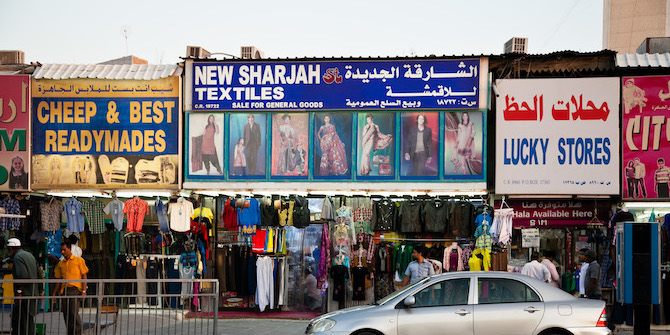


Now that I’ve read a few of your articles, I really enjoy your blogging style. It has been added to my favorites list and I’ll be checking back soon…Thank you for sharing
Factocert provides ISO certification services in South Africa as well as other ISO certifications such as HACCP, CE MARK, Halala certification.
Nice Article. Below is the link of article like this also read it.
https://om.academicswritingservice.com/2020/07/29/the-economy-of-oman/